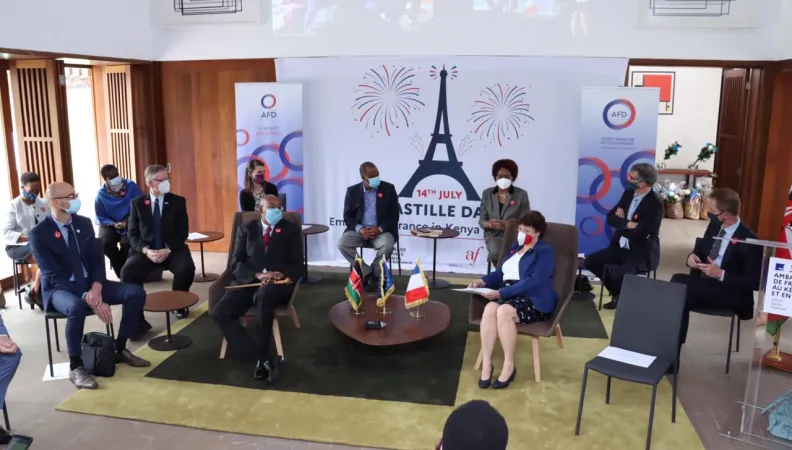Share the page
Response to Covid-19 Crisis: France commits to finance Kenya Red Cross Society and Fresh Life Initiative

On the occasion of Bastille Day, tampered this year, by the running COVID-19 pandemic and mostly virtually celebrated, S.E.Mrs. Aline Kuster Ménager, Ambassador of France to Kenya, Dr. Asha Mohammed, Secretary General of the Kenya Red Cross Society (KRCS), Mrs Lindsay Stradley, Fresh Life Initiative (FLI) Executive Director and Mr. Ghislain de Valon, Agence Francaise de Developpement (AFD) Kenya Director, agreed on two projects in support to vulnerable households in informal neighborhoods of Nairobi, as part of the fight against the spread and consequences of COVID-19.
Kenya Red Cross Society’s Cash transfer program:
AFD committed to finance a KRCS cash transfer project with a 500 000 euros grant (about 60 million Ksh), that aims to support about 2000 families – 10 000 people – during 3 months. This will be done by providing them with the necessary amount to afford half of the calculated Minimum Expenditure Basket, via KRCS’s implementation. It will directly increase the resilience of these households as a response to the crisis, but will also contribute to strengthening of national social protection mechanisms in the longer run.
In response to the Covid-19 pandemic, the Government of Kenya has embraced the use of cash transfers to deliver its shock responsive safety nets. Their advantages range from empowering vulnerable populations and providing flexible options that allow the affected communities to address their needs, to promoting local economy with positive multiplier effects. However, due to over-stretched government resources, the regular beneficiaries enrolled in the social protection systems receive a monthly allocation which is deemed too low to cover the Minimum Expenditure Basket in time of such crisis.
In view of the above, Kenya Red Cross, in the wake of a European Union initiative, has proposed to the AFD a cash transfer program aiming at both increasing the amount received by households under the government’s programs in the form of top-ups, and identifying new beneficiaries that are not covered but meet selected vulnerability criteria. Women, in particular, will be considered a priority targeted population in this program, given their roles as caregivers in the home and community, their over-representation in the informal economy, their low access to health information and services and their susceptibility to sexual and gender-based violence as a result of quarantine measures.
Fresh Life Initiative access to sanitation program:
Additionally, AFD committed to finance FLI project with a grant of 1 million euros (about 120 million Ksh), which aims to improve access to sanitation and hygiene for about 35,000 inhabitants of Nairobi’s informal settlements, thereby fighting, in the short-term, against the spread of Covid-19, and providing sustained safe sanitation in the long-term. Undertaken by Fresh Life Initiative, it will include construction and installation of 882 toilets during the project’s first year, in the wide informal settlements of Mukuru and Mathare. The financing will cover for the toilets’ operational costs for 2 years, covering mainly the collection of the faecal sludge.
In addition, specific actions will be undertaken aiming at raising Covid-19 awareness and limiting transmission of the virus, including campaigns via mobile phone applications and SMS, training materials and posters on each toilet, awareness and hygiene campaigns directed at operators, users, and communities, as well as purchase of Personal Protective Equipment for FLI staff.
About half of Nairobi’s population lives in extremely densely populated informal settlements. In the face of the Covid-19 pandemic, their vulnerability has increased: a higher risk of contracting the virus due to lack of access to essential services, loss of income which is likely to further worsen their health, living conditions that are conducive to the spread of second-order diseases, such as cholera.
Since 2011, Fresh Life Initiative has been dedicated to installing dry toilets in the neighborhoods of Mukuru and Mathare, where access to the sewerage system is rendered difficult by topography and population density. Construction of the toilets is carried out by FLI, who ensures toilets are regularly maintained and the excreta are safely and professionally collected. This specific program will additionally provide all toilets’ operators and users with hygiene trainings to protect their health.
These supports against Covid-19 are part of the broader #TeamEurope response which is the tangible expression of the European Union Member States solidarity to help partner countries deal with the Covid crisis. In that respect, France launched the “Health in Common” initiative to provide a fast, targeted and partner-oriented response all over Africa. Launched three months ago, it has already financed 24 projects in response to the pandemic in 15 African countries for a total of €512 million, in the form of loans and grants.
Press contacts:
